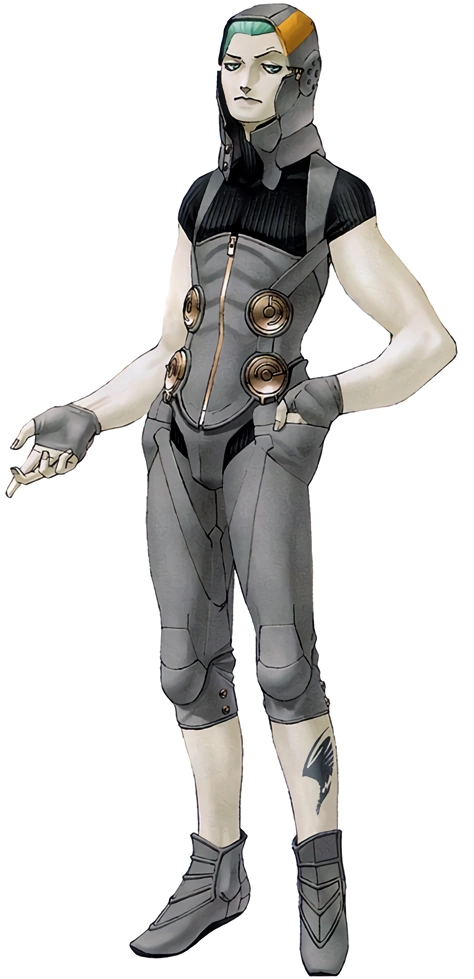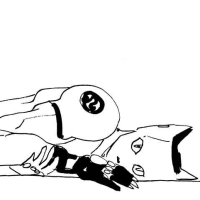For the record, Milly agreed to let me respond in his stead. Given that, I should take the opportunity to address the arguments from the first page, since it seems like I missed a lot in-between my second comment and my response to Executor. Either way, this will most likely be long, so:
Just because two separate authors have legal rights to write in a setting, does not mean they each intend for their settings to be canon to each other.
And if Atlus decided that "wrapping up the kinks" involved removing the 1-A statement, we should respect that, and not what Yu went off to do afterwards.
Because of the pre-commitment in the contract, they lost the ability to address problems with the exact ways she expands upon their IP. When hiring/contracting publishers/authors to create other works for them, they're still in control of that. If you just give everyone else the rights to expand on your work (i.e. by making it public domain) that doesn't make everyone else's works canon, basically I think creative control of the primary entity is the main factor, not IP rights, as IP rights alone fail in many areas.
That's not what that means. We have established over and over again that she signed a contract giving her those rights in advance of working on the game or the novel. No ******* shit she wouldn't end up infringing on rights she already has. Companies (usually) don't just get to say "lol we'll be taking those back actually". This does not indicate that Atlus was happy with the end product, all this indicates is that the contract she signed 7 years earlier still applies.
Correct me if I'm wrong, but based on these statements and the question regarding Atlus' creative power over Quantum Devil Saga, I assume you're discussing canon based on uncertainties regarding the creative intent of the author, no? If that's the case, I'm not sure how well that goes here, considering that Yu Godai worked on all of the parts of the worldview that ultimately made it into the games, and so the 1-A statement, as with everything else that crosses over between both continuities, is not much different from a "Word of God"-type statement, at least in the sense that it transmits her intent regarding what she pitched and then developed for a time, and which came out the same in essence. Under those premises the only contention is whether this intent is contradicted.
She may not have been employed by Atlus when writing the novels, sure, but, for reference,
back when I pointed out that a few profiles from Minecraft were actually 1-C going by the profiles' justification, the argument first brought up and most accepted against the very existence of the affected profiles at all was an interview with the author of the End Poem, who was not affiliated with Mojang by the time of the interview and (As far as I'm aware) served only as a freelance writer for the Poem itself (Much like Yu Godai did for Digital Devil Saga). The thread ended up being accepted and the profiles deleted as a result, so, as far as I can tell, when they are not contradicted, concrete expressions of original author intent can indeed be taken as valid.
Based on how the rest of the discussion went and the summary of it in
this post, I assume the answer to that is something to the effect of "They changed the scenario after she left anyway," but fumbling over whether Atlus as a company or the other writer (Tadashi Satomi, who as noted was only there to translate her narrative into a playable form) would disagree with the statement is pointless, especially given how specific and only of interest to battleboarding it is, and since Godai left after what she described as "a number of talks" with Atlus over which she refined the project, and then working on it further with Satomi. In lieu of actual word from Atlus, the contract's existence very much speaks for itself.
Because public domain works give everyone power over IP, but don't give everyone power over canon. Someone who was contracted to make a manga adaptation could say that a certain novel isn't canon, but that wouldn't matter, since their authority only lies with the manga adaptation; the novel author would be the one with authority over canon.
If you just give everyone else the rights to expand on your work (i.e. by making it public domain) that doesn't make everyone else's works canon, basically I think creative control of the primary entity is the main factor, not IP rights, as IP rights alone fail in many areas.
To extend the above argument: That's a flawed equivalency because the degree to which different people can be involved in your work also differs, and the expiring of its copyright makes its properties liable to be exploited by multiple random people regardless of how distant from the original production they were, what impact they had, and what setting they had in mind, which is why canon and extra-canon are divided to begin with. If Quantum Devil Saga came from the head of some random janitor at Atlus instead, I sure as hell wouldn't want to use that.
Huh? We've already established that the contract allows them to do that, that doesn't mean that the western LN publisher decides what the video game company accepts as canon.
It means that their usage of the SMT trademark falls under fair use regardless, since in all cases, you are simply not allowed to use another company's trademark to inaccurately describe an aspect of your product or claim ties to theirs (And as far as I am aware, that applies to online advertising, too, though I'm not as certain on that one, so, corrections are welcome). At the very least direct permission is required in exchange for a payment, in such cases.
And, although I'm less certain on this, as far as I'm aware, any details added to feats would have to be done in a corresponding scene, not in an entirely new scene.
Is that so? AKM's example specifically made mention of "an added scene," so given that, I assumed the above was fine. If what you say holds, then I'm willing to cut that branch of the argument. The scene at the very end, where Schrodinger welcomes his counterpart into Nirvana, does have a direct correspondence with DDS2's ending scene, and since we are deeming Megami Tensei as a whole to be the primary canon, losing your ego and dissolving into the unconscious is also something that's featured plenty of times. But Serph explaining his experiences in Nirvana to the rest of the cast indeed doesn't have a corresponding scene (For the reasons explained below), at least, as far as I recall.
It doesn't take many words to say "Or possibly, what I had done was expand beyond even the concept of 'dimension' and into an unknown space." That excuse does not seem viable to me.
In this case, it would be. In the book, the 1-A statement is done by Serph, the protagonist, who in the game isn't at liberty to speak anyway because of Atlus demanding that he be made into a silent character whose only actions are made by the player, and since otherwise no one else experiences that again in either the novel or game, the core nature of God and the world at large is rendered a mystery to everyone involved up until the very end. The nature of the protagonist is one of the limitations of a video game medium Yu Godai mentioned in her afterword, even.
You are claiming that Atlus employees directly helped Yu Godai write the LN.
For proof of this, you are showing that Atlus employees helped Yu Godai when writing the game, and that she used that knowledge when later writing the LNs. All this proves is that Yu Godai has a memory. You are also showing that Yu included a character from the games in the LN. All this proves is that Yu played the games (or at least knew of the existence of that character) and decided to incorporate it in her story.
See above. Yu Godai and Tadashi Satomi nevertheless still colaborated on the aspect of scenario writing that involved the setting and worldview of the game, and any changes made by him after she left were by and large focused on the arrangement of the story that sprung from this setting. It's still reflected both in Quantum Devil Saga and in Digital Devil Saga.
Didn't she got the okay to use things like that through her contract, which would've been signed before starting work on the game?
That's true enough, yeah, since Atlus commissioned her to write the scenario and plot to begin with. Gale's presence in the novels does show that the terms of her contract allowed her to make use of material exclusive to Atlus that was not yet instantiated in the original draft at the time, but I'm not too sure on how that'd impact the discussion if I'm understanding you correctly.
Actually, now I'm also curious why
this scan you just linked is the
exact same (minus two differences in comma placement) as
this scan from the OP of the last thread until the third paragraph, where they both become vastly different.
That was an error, it seems. For reference, the scene happens throughout pages 199-200, with the 1-A statement starting right after the paragraph where the narration describes Serph and Sera's mutual understanding over the realm he was in.
Here is page 200, if you want to extract the text and confirm for yourself.


